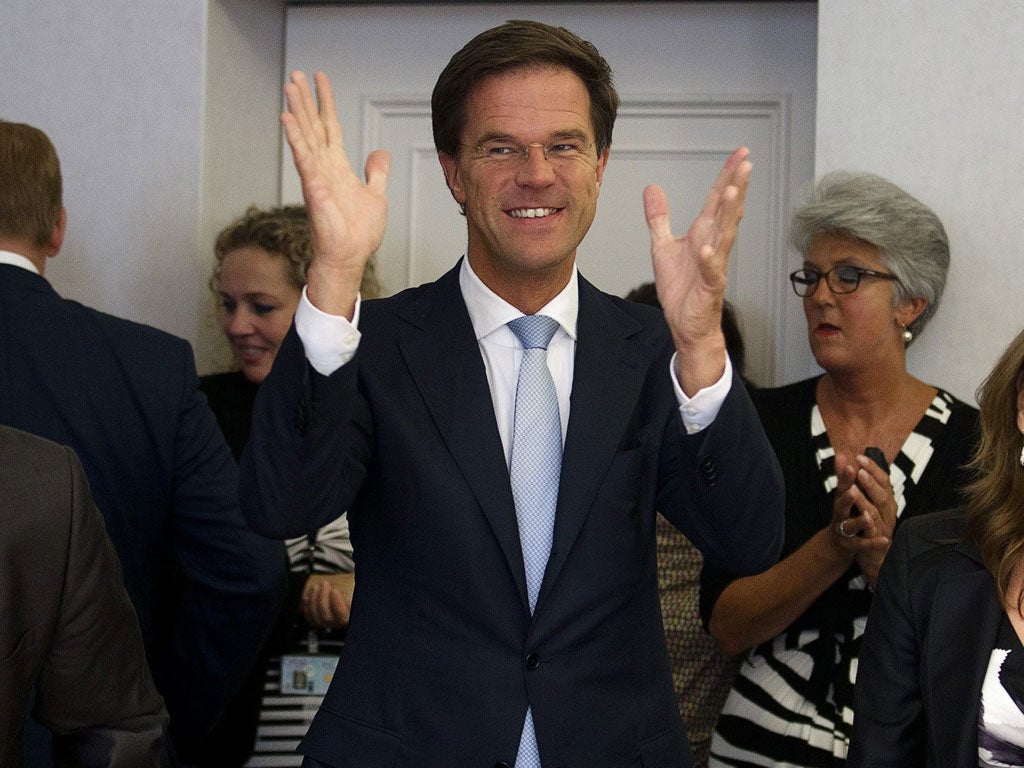Eurosceptics and extremists get 'slap in the face' in Dutch election
Voters chose to endorse the mainstream pro-Europe conservative and Labour parties

Your support helps us to tell the story
From reproductive rights to climate change to Big Tech, The Independent is on the ground when the story is developing. Whether it's investigating the financials of Elon Musk's pro-Trump PAC or producing our latest documentary, 'The A Word', which shines a light on the American women fighting for reproductive rights, we know how important it is to parse out the facts from the messaging.
At such a critical moment in US history, we need reporters on the ground. Your donation allows us to keep sending journalists to speak to both sides of the story.
The Independent is trusted by Americans across the entire political spectrum. And unlike many other quality news outlets, we choose not to lock Americans out of our reporting and analysis with paywalls. We believe quality journalism should be available to everyone, paid for by those who can afford it.
Your support makes all the difference.Negotiations have begun in the Netherlands to form a new coalition government after a resounding victory for pro-Europe parties in a general election that quashed fears of a comeback by Eurosceptics on the far right and left.
In the run-up to the Dutch vote, there were concerns that the anti-Islamic and anti-Europe Freedom Party of the right-wing populist Geert Wilders and the similarly Eurosceptic far-left Socialist Party would win enough votes to seriously undermine the country's pro-Europe consensus.
Instead, Dutch voters chose to firmly endorse the mainstream pro-Europe conservative and Labour parties. Mark Rutte's governing conservative VVD party, which recently pushed through a tough austerity programme to counter the eurozone debt crisis, won a total of 41 seats in the 150-seat parliament.
His closest rival and most likely coalition partner was the Labour leader Diederik Samsom, whose party won 39 seats. The poll brought a humiliating defeat for Mr Wilders' Freedom Party which lost nine seats. The Socialist Party retained its 15 seats.
The result, which came only hours after Germany's constitutional court gave the nod to the permanent eurozone bailout fund, was seen as a vote for the struggling currency bloc.
Guy Verhofstadt, leader of the conservative Alliance of Liberals and Democrats for Europe in the European Parliament, described the election as a "slap in the face for anti-European extremism and populism".
Both of the Netherlands' main parties will have to make concessions if they are to form a workable coalition. Mr Rutte, the Prime Minister, is an advocate of austerity and has been compared to Germany's Angela Merkel. Mr Samsom is like France's President François Hollande and favours growth.
The Dutch pro-Europe vote followed last week's landmark decision by the European Central Bank (ECB) to start buying short-term government bonds from countries that apply for financial assistance , providing they submit to strict conditions. Yesterday, both Italy and Ireland were reported to have obtained additional funding at substantially reduced interest rates simply by dint of last week's ECB decision.
However, Greece and Spain continue to cause concern. The Troika of inspectors from the International Monetary Fund, the European Commission and the ECB still have to deliver their verdict on the Athens government's progress in implementing key economic reforms. Their most recent assessment concluded that Greek progress on countering tax evasion was "uncertain".
Spain, meanwhile, is under pressure to resolve its deepening banking crisis by applying for a limited assistance programme.
Greek unions call general strike over austerity
Greece's largest labour unions have called a general strike for 26 September in response to a new government austerity package that is expected to worsen hardship in the recession-hit country.
A spokeswoman for the General Confederation of Greek Labour said a civil servants' union would also participate in the strike. The protest comes as the country's creditors demand that Greece's conservative-led government slash a further €11.5bn (£9.2bn) in budget costs over the next two years, – resulting in wage and pension cuts – if the country is to continue getting bailout loans.
The austerity measures already imposed as part of this bailout deal have held back growth, pushing the country into a three-year recession. Government figures released yesterday showed that unemployment in Greece had risen further to 23.6 per cent in the second quarter of 2012 – up from 16.3 per cent the previous year. AP
Join our commenting forum
Join thought-provoking conversations, follow other Independent readers and see their replies
Comments